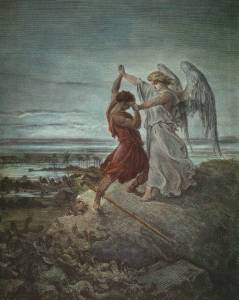
“And Jacob called the name of the place Peniel, [saying] ‘for I have seen God face to face, and my life was saved.’ And as he passed over Penuel, the sun rose over him, and he was limping on his thigh. Therefore, the people of Israel shall not eat the displaced sinew, which is in the hollow of the thigh, unto this day” (Genesis 32:31-33)
This has been a difficult week here in Gush Etzion, as we’ve been mourning three holy Jews (my friend and neighbor Rabbi Yaakov Don, American yeshiva student Ezra Schwartz, and Israeli seminary student Hadar Buchris, may God avenge their deaths) who were murdered in recent days at the Gush Etzion junction, just down the road from my home.
Of course, violence, terrorism and senseless murder are nothing new. We Jews have experienced this many times before – in recent weeks and months here in Gush Etzion and every other part of Israel, and before that for the past hundred years or so since the local Arabs adopted terrorism as their primary weapon against us, and before that all over the world throughout centuries of exile. But still, human nature is such that when it hits close to home and affects people you know or have some personal connection to, it feels different. So it’s been a pretty depressing week here in the Gush.
We are facing bitter adversaries who see great glory in the act of randomly and mercilessly cutting down the lives of good people whom they have never met. We are infuriated at these enemies, horrified by the depth of their evil, and frustrated that our security forces have not yet found the tools to effectively prevent this newest pattern of atrocities. And, as always happens when tragedy strikes good people, the religious questions about why God allows these things to happen – questions we usually live with because we understand that humans can never have an answer – bubble up to the surface and dominate our thinking. At times, even for a diehard optimist like myself, it becomes hard to know how to keep on going.
Perhaps an insight can be found in today’s Torah portion (Vayishlach).
This morning, we read about the strange prohibition on eating the gid hanasheh (literally “displaced sinew”, interpreted in Jewish law as referring to an animal’s sciatic nerve). As the above-quoted verses tell us, this commandment recalls the strange encounter between our forefather Jacob and the mysterious “man” who wrestled with him all night long. Our sages identify Jacob’s opponent as an angelic figure, and Rashi tells us that it was the spiritual representative of his earthly brother and opponent, Esau. Regarding the commandment itself, the medieval Sefer HaChinuch says that it is meant to serve as an encouraging reminder: by refraining from consuming the gid hanasheh, we are to remember that even though we may suffer much throughout history at the hands of our enemies, we will always survive and ultimately prevail, just as our ancestor Jacob did when confronted by his enemy.
This explanation always seemed strange to me. If the mitzva is meant to encourage, then why choose something which reminds us that Jacob’s enemy managed to wound him, rather than a symbol of his eventual triumph? And also, how is a prohibition meant to help us remember something? If the gid hanasheh somehow reminds us of Jacob’s victory, then perhaps the mitzva should not be to abstain from it, but rather to specifically eat it as a reminder, just as we do with matza on Passover.
In our current circumstance, though, I think the Sefer HaChinuch’s point becomes clear. At times, just like our forefather Jacob, we will be wounded. But we will survive – not only in spite of the injury but in some sense because of it. The wound is excruciatingly painful, it is crippling, and for a time it seems as though we can barely move ahead. Though we managed to squeeze some sort of a victory out of the last round of fighting, we wonder if we’ll win in the long run.
This is when the gid hanasheh comes and reminds us, first of all, that in the perspective of history, these setbacks – however painful they may be – are temporary (in the very next chapter, we read that Jacob’s injury was fully cured; see Rashi on 36:18). And as a mitzvah that is observed passively through the mode of shev v’al ta’aseh (sit and do nothing), it reminds us that this is also how Jacob achieved his victory:
“And he wrestled with him until daybreak. And when he saw that he could not defeat him, he touched the hollow of his thigh [wounding him].... and he said ‘Release me, for the morning has come’, and [Jacob] said ‘I will not release you unless you bless me’... and he blessed him there.” (32:26-30)
Although he fought long and hard, Jacob didn’t manage to defeat his enemy. All he was able to achieve was a stalemate – a bitter night-long struggle that wore both sides down, with no winner. In that situation, he wasn’t able to actually do anything; just to absorb the blows, and persevere. But the gid hanasheh teaches us that sometimes, when there is no action to be taken, shev v’al ta’aseh is enough. Sometimes, the key to victory is just staying where you are and refusing to be knocked down, and to keep on going without paying too much attention to the pain.
After the long night of exile, the morning eventually comes. And when it does, the enemy melts away and asks for a release, which he receives only after issuing a blessing. Until then, we have to continue the struggle.

Sign up for my newsletter for periodic articles along with updates on new talks, classes and videos, and upcoming speaking engagements and public tours